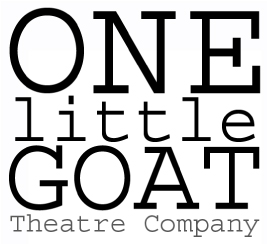Ever
see a moose in a lyrical if sometimes manic mood?
You’ll
find one in the Tarragon Extra Space, where One Little Goat Theatre, dedicated
to presenting poetic drama, offers the English premiere of Quebec writer Claude
Gauvreau’s play The Charge Of The Expormidable Moose, in Ray Ellenwood’s
translation.
Absurdist,
poetic and leaping wildly between madcap comedy and upsetting tragedy, the play
was a flop in its original 1970 presentation. Regarded as a visionary writer,
Gauvreau died in 1971, following years in a psychiatric hospital after the
suicide of his muse.
That
personal history most likely figures in the play, in which the central
character, a poet named Mycroft Mixeudeim (Ben Irvine) lives in… a home? an
asylum?… with four others (David Christo, Lindsey Clark, Lindsay Owen Pierre
and Jessica Salguiero) who constantly play tricks on him. Unable to resist
bashing down doors with his head to reach any woman he thinks is in distress,
the naive Mycroft is regularly “called” by the planned shrieks of women, who
then deny what they’ve done.
Are
they four therapists trying to cure Mycroft’s sadness over the loss of his
girlfriend, since they keep trying to pigeonhole him using various psychiatric
labels? Or maybe they’re meddling, nasty friends who can’t resist playing with
his head and repeating the cruel joke over and over? Gauvreau doesn’t say.
At
the end of the first act, a helicopter pilot (Sochi Fried) crashes on the
isolated property and becomes Mycroft’s main defender, though she’s not immune
to being part of yet another attempt to cure him. And halfway through the
second half, a sadistic man (Hume Baugh) takes over to make Mycroft’s life an
even harsher hell.
The
writing is shot through with passages of grandiose language, bits of nonsense
and gibberish and is occasionally reminiscent of Beckett; at one point, Mycroft
delivers a speech that stylistically echoes Lucky’s monologue in Waiting For
Godot.
Director
Adam Seelig’s given a lot of thought to the demanding script in this fine
production. Fried makes a sympathetic figure, and her scenes with Irvine are
the most moving in the production, even when they’re discussing philosophical
matters. Baugh’s black-garbed, cold figure is properly powerful, hard for the
others to resist.
It’s
Irvine who anchors the show with a bravura performance, whether speaking
monologues to a mirror, or, when Mycroft is drugged, miming various absurdist
scenarios (a camel becomes an elephant, a Turkish dancer morphs into a
threshing machine, an orator changes into a grasshopper). Splendid work.
Jackie
Chau contributes an inventive design, including a series of pastel doors whose
handles are hands, suggestive of a surreal Cocteau film. She puts the quartet
of housemates in variations on tennis whites, though the games they play are
aggressive and not at all fun. In Chau’s hands, the helicopter pilot becomes a
vision in leather and parachute silk.






